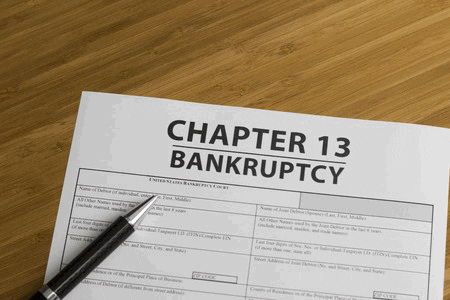 In bankruptcy Chapter 13 is a form of bankruptcy which is organized under Chapter 13 of the bankruptcy code. Chapter 13 bankruptcy is arguably a more complex form of bankruptcy than Chapter 7 bankruptcy. Chapter 13 bankruptcy and Chapter 7 bankruptcy are the two most commonly filed Chapter of bankruptcy.
In bankruptcy Chapter 13 is a form of bankruptcy which is organized under Chapter 13 of the bankruptcy code. Chapter 13 bankruptcy is arguably a more complex form of bankruptcy than Chapter 7 bankruptcy. Chapter 13 bankruptcy and Chapter 7 bankruptcy are the two most commonly filed Chapter of bankruptcy.
Chapter 13 bankruptcy is commonly used to stop foreclosures on real property such as individual homesteads, stop repossession of automobiles and other important property, and stop garnishments, particularly by the Internal Revenue Service, and other governmental entities.
Chapter 13 bankruptcy is also filed by debtors whose median income, as determined by their family size, significantly exceeds the amounts published by the US Trustees Office. If a debtor’s income significantly exceeds the median income amounts, the debtor may not qualify for the filing of a Chapter 7 bankruptcy and may need to file a bankruptcy under Chapter 13 in order to manage his or her debts.
That does not mean that the debtor is disadvantaged by the filing of the Chapter 13 bankruptcy. Bankruptcy under Chapter 13 can offer a number of benefits and advantages that are not present in the filing of a Chapter 7 bankruptcy.
If you are considering whether to file bankruptcy either Chapter 13, Chapter 7, or are considering other remedies to help alleviate the problems and issues associated with debt, then Jay Weller and Weller Legal Group PA are here to help. Since 1993, Mr. Weller has represented many thousands of clients in bankruptcy proceedings and other matters outside of bankruptcy but related to the management, reduction, and elimination of debt.
Bankruptcy Chapter 13 or Chapter 7 is an area of law that is becoming progressively more complex and demanding of its practitioners. Mr. Weller and his Attorneys and Paralegals are experienced and knowledgeable in all facets of bankruptcy law.
We are here to help you. Please contact us today either through our website or by calling us directly at 1-800-407-3328 (DEBT).
Copyright : Daniel Fela
